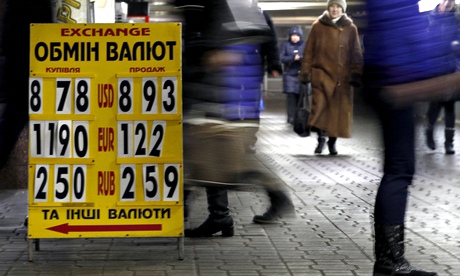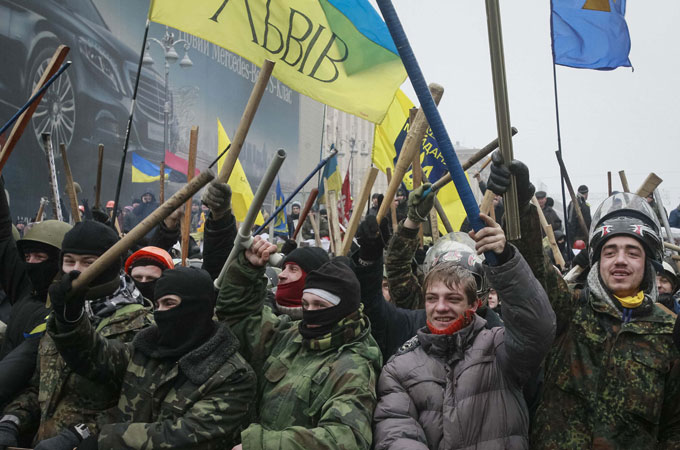http://www.theguardian.com/world/2014/feb/07/ukraine-currency-controls-political-crisis

Fitch downgrades Ukraine's credit rating as currency controls are imposed
Ratings agency fears steep and uncontrolled depreciation of the currency as central bank limits private transfers abroad of around $5,700 a month

Exchange rates in a subway in central Kiev, Ukraine. Photograph: David Mdzinarishvili/REUTERS
Ukraine's economic woes deepened on Friday after Fitch downgraded its credit rating and the central bank imposed new capital controls to bolster the hryvnia. The ratings agency cited the ongong political instability and fears over its debt repayment schedule as it downgraded the country from "B-" to "CCC". Fitch added that "political uncertainty has contributed to a weakening in confidence in the Ukrainian hryvnia and in the exchange rate policy".
Ukraine is struggling to prop up its currency amid a political crisis that has seen anti-government demonstrators take to the streets to protest against a move closer to Moscow's economic orbit, and a debt crisis that has left it on the verge of bankruptcy.
Russia suspended a $15bn (£9.18bn) bailout last week after President Viktor Yanukovich, in a concession to protesters, sacked the pro-Russian prime minister.
Moscow says it will only restart the funding once it knows who will be the new prime minister. Yanukovich was due to meet President Vladimir Putin in the Black Sea resort of Sochi, where the Winter Olympics open on Friday night.
The central bank says the currency controls will be temporary. The controls, announced late on Thursday and imposed from Friday morning, include a limit on private transfers abroad of around $5,700 a month or 50,000 hryvnia and bans on purchases of foreign currency for overseas investment or early repayment of loans.
"The central bank has effectively imposed capital controls. The result will be a flourishing black market (in dollars)," said Tatiana Orlova, an emerging markets strategist at RBS in London.
She said it could send Ukrainians to the cashpoints to withdraw hryvnias, although on Friday there was little sign in the capital Kiev that news had filtered through. Many Ukrainians, hurt by earlier crises, keep their savings at home.
Central bank officials said the hryvnia was now at an "adequate" level after a 10% slide since November, when protesters took to the streets over Yanukovich's rejection of an EU trade agreement in favour of closer ties with Russia. They stressed that the new controls would be temporary.
"There have been strains on the currency market recently, but we are sure this is only a short-term trend," the governor of the National Bank of Ukraine, Ihor Sorkin, told a news conference.
"The National Bank will strengthen monitoring control on the market to try to reduce speculative demand ... When the situation improves, these temporary measures will be removed."
Ukraine's foreign currency reserves fell to $17.8bn as of 31 January, their lowest since 2006, from $20.4n at the end of December. The drop came even though Russia has paid the first $3bn tranche of the bailout.
The bank attributed the January drop in its foreign reserves to debt repayments of $1.1bn, including $650m to the International Monetary Fund, as well as interventions on the currency market totalling $1.7bn.
Among the new controls, clients wishing to buy foreign currency will be required to tie up their funds for six days in special accounts before receiving it. Insurance companies have been banned from buying foreign currency to cover part of insurance reserves.
Individuals can transfer abroad no more than 50,000 hryvnia – now worth about $5,700 – in foreign currency a month. Some exemptions will be available for purposes such as payments for education or medical treatment.
The hryvnia fell below 9 per dollar on Wednesday for the first time in five years. It traded at 8.53/8.56 against the dollar on Friday, having been at around 8.9 on Thursday, and was down against major currencies. Fitch said that while an orderly currency depreciation could aid a reduction in its current account deficit, "there is a risk of a steep and uncontrolled depreciation, given the fragile confidence in the hryvnia."
The head of the bank's monetary policy department, Olena Shcherbakova, said the bank would continue to intervene in the currency markets and the exchange rate for the hryvnia was "adequate" at the moment.
"The situation is completely controllable and manageable," she said.
Russia presses Ukraine on debt amid protests | |
Russian finance minister pledges to give second tranche of $15bn bailout package, but wants gas debt paid first.
Last updated: 08 Feb 2014 15:21
| |

The protesters have been demanding resignation of the president and early elections [Reuters]
| |
Russia has increased economic pressure on Ukraine by drawing a link between disbursement of the next tranche of its $15 billion aid package to Kiev with repayment of a hefty gas bill owed to Russian firms.
The link, made in comments by Russia's finance minister to the Reuters news agency on Saturday, came as the Kremlin confirmed President Vladimir Putin had held private talks with Ukraine's leader Viktor Yanukovich in Sochi on Friday before the opening of the Winter Olympics. No details of the leaders' talks were disclosed. "We will fulfill what we have promised to Ukraine, but we would like the Ukrainian side to comply with the obligations that it has committed to," Anton Siluanov told Reuters. The gas debt was due for repayment in late January, but Ukraine did not pay up, he said. On Saturday, thousands of people angered by months of anti-government protests in the Ukrainian capital, Kiev, converged on one of the protesters' barricades, the Associated Press news agency reported. They retreated after meeting sizeable resistance, averting a violent showdown. The incident underlined tensions that persist as the protests slog through a third month with no sign of concessions from either side. About 2,000 people streamed toward the barricade near city hall at midday, blocking traffic on the capital's main avenue and placing tires in the roadway. Igor Polishchuk, one of the men placing the tires, said the crowd wanted to show its peaceful opposition to the protests that have pushed the country into a political crisis and complained that police had done little against the protesters. "It's a critical mass in there, without control," he said. "The authorities aren't anywhere inside." EU versus Russia The anti-government protesters have set up an extensive tent camp in Kiev's main square and occupy three nearby buildings, including the city hall, that they use for operations centres, sleeping quarters and even an improvised library. Yanukovich has been battling massive anti-government protesters, demanding his resignation and early elections, since he rejected a trade deal with the EU in favour of closer ties with Russia. The president must now decide whether to submit to protesters' demands by taking a more conciliatory approach towards a new agreement with the EU - a possibility that prompted Russia to suspend its bailout payments after issuing just one instalment of $3bn in December. The US and the EU have backed the anti-government protests and promised a financial package to Ukraine on the condition that the government agrees to political reform. US will give money to Ukraine if Kiev makes necessary reforms - Nuland
The United States is ready to provide financial support to Ukraine if the country implements the necessary political reforms, senior US diplomat Victoria Nuland said.
“We have had extensive discussions at all meetings concerning support from the international community, including the United States,” Nuland, the Assistant Secretary of State for European and Eurasian Affairs said at a press conference in Kiev on Friday.
“[The United States] is ready to support Ukraine if the will quickly move towards the path of protecting human rights, dignity, a de-escalation of the conflict, and political reforms.”
Nuland’s offer of support follows the leak of an apparently bugged phone conversation in which the senior US diplomat had choice words for the EU’s mediation efforts in Ukraine.
On Thursday, a four-minute video - titled ‘Maidan puppets,’ referring to Independence Square in Ukraine’s capital – was reported in the Kiev Post. In the clip, Nuland is allegedly heard saying “f**k the EU" while speaking with the American Ambassador to Ukraine Geoffrey Pyat on how to end the crisis in Ukraine.
US State Department spokeswoman Jen Psaki declined to comment on the tape’s contents, but did not deny its authenticity.
"I did not say it was not authentic," she said, adding that Nuland had apologized to her EU counterparts for the reported comments.
Nuland said she would not comment on her conversation with the US ambassador to Ukraine, in which the two discussed who should be in the next Ukrainian government. Nuland did say, however, that the phone recording was “pretty impressive trade craft, hinting that the leak would not hurt relations with the Ukrainian opposition.
Speaking about the impact of the leaked conversation on US-Russia relations, Nuland noted that bilateral ties were deep and complex, and the both sides are working on a range of issues including Iran, Syria arms control.
She further noted that the US and Russia were both working to ensure the country’s future.
"We are in talks with Russia over the situation in Ukraine. All of us - Americans and Russians, all of Ukraine's neighbors have an interest in a stable, peaceful and democratic Ukraine. The US is working on it and we hope that Russia is working towards this end as well,” she said.
Meanwhile, on Thursday a spokeswoman for German Chancellor Angela Merkel said that Nuland’s comments were “totally unacceptable.”
German spokeswoman Christiane Wirtz said Merkel appreciated the work of EU foreign policy chief Catherine Ashton, who has attempt to mediate between President Viktor Yanukovich and the opposition.
"The chancellor finds these remarks totally unacceptable and wants to emphasize that Mrs Ashton is doing an outstanding job," Reuters cites Wirtz as telling a news conference.
| |





No comments:
Post a Comment